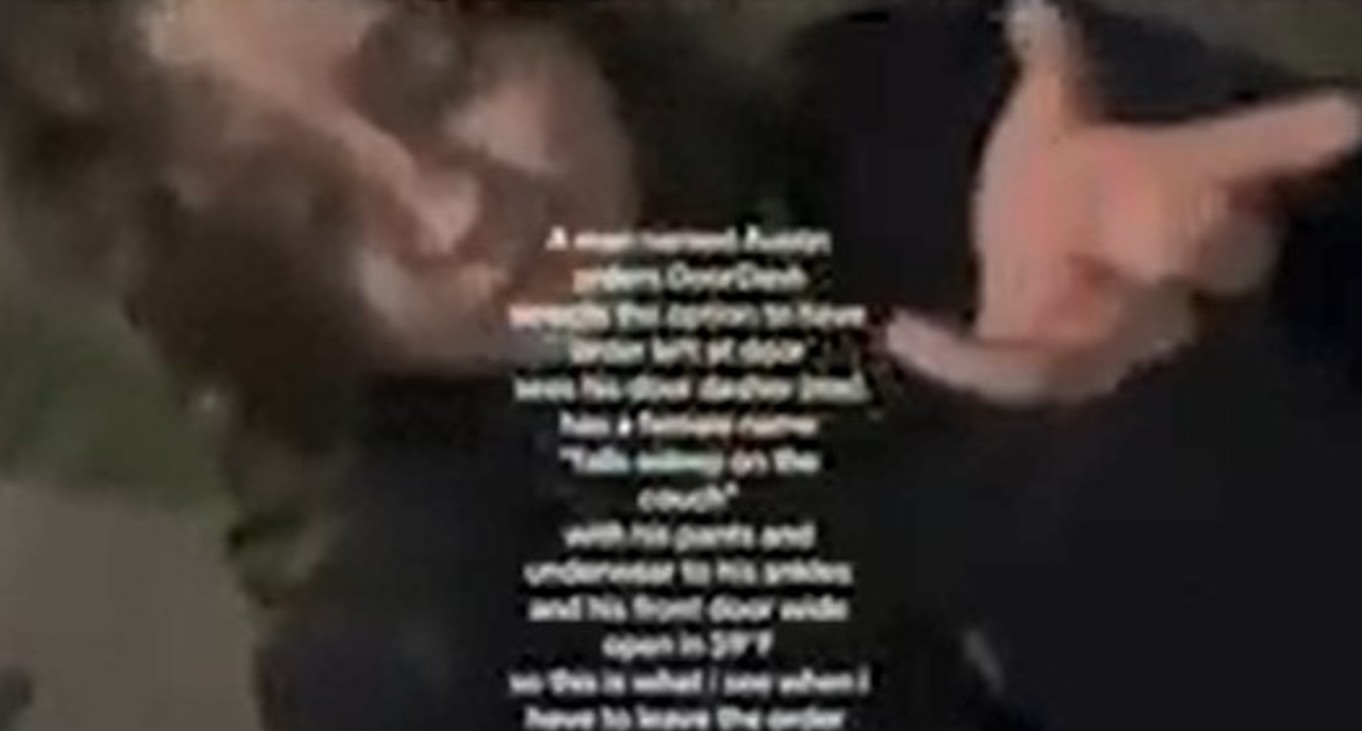DoorDash Girl SA Original Video Sparks Controversy
In recent days, a video known online as the “DoorDash Girl SA original video” has ignited widespread discussion and controversy across social media platforms. The clip, which reportedly surfaced unexpectedly on sites like X (formerly Twitter), Reddit, and TikTok, has prompted heated debates about privacy, consent, and the moral responsibility of internet users. While the identity of the woman featured remains uncertain, the rapid spread of the footage highlights a troubling pattern in modern digital culture one where viral fame and privacy violations collide in real time.

Contents
The Viral Video and Public Reaction
The virality of the DoorDash Girl SA video was almost instantaneous. On X (Twitter), hashtags referencing the video trended for days, while Reddit communities discussed its authenticity and origin. TikTok users reacted with commentary videos, memes, and moral discussions many of which garnered millions of views. Unfortunately, this attention also led to the spread of edited or fake clips, blurring the line between truth and fabrication.
The uncensored video of DoorDash Girl SA has become a hot topic online, with social media users debating her behavior and actions
doordash-girl-sa-original-video.mp4
The online community split into different camps. Some users expressed sympathy for the woman, emphasizing that no one deserves to have private footage leaked or shared without consent. Others treated the controversy as entertainment, spreading the video or using it to generate content for followers. Meanwhile, a third group condemned the overall behavior, warning about the dangers of consuming or sharing leaked material, especially when the origin and consent are unclear.
This clash of perspectives reflects a larger issue: the internet’s voracious appetite for sensationalism, often at the expense of personal privacy and empathy.
Who Is the “DoorDash Girl SA”?
The name “DoorDash Girl SA” first appeared as a trending search term shortly after the clip began circulating. The phrase “DoorDash Girl” seems to refer to a young woman who allegedly works for DoorDash, the popular food delivery platform. The “SA” portion of the tag has fueled speculation: some believe it stands for her initials, while others interpret it as a regional reference possibly South Africa or San Antonio. Because of this ambiguity, countless social media users began speculating about her real identity, with some accounts even sharing misleading or unrelated photos.

What began as a small thread on niche online forums soon evolved into a global viral incident, spreading far beyond its original context. Within hours, the video was reposted, duplicated, and discussed across different platforms, reaching audiences who had no prior knowledge of the people involved. As interest grew, so did misinformation, with various users claiming to have “the original unedited version,” further deepening the confusion and controversy.
The Core of the Controversy
At the center of the debate lies a set of ethical questions. Was the video authentic or manipulated? Did the woman consent to it being shared? And if not, how should society respond to such violations?
Others speculate that it might have been staged or fabricated for attention an accusation that itself can be deeply damaging, especially when directed at someone who may already be a victim.
Regardless of the truth, the moral damage has already been done. The woman real or misidentified has become the subject of intense scrutiny, ridicule, and objectification. In a digital environment that rewards virality over verification, personal suffering becomes public spectacle in a matter of minutes.
Company and Public Response
Though the controversy carries the “DoorDash” name, the company itself is not directly involved. As of now, DoorDash has not issued a formal statement, likely because the event does not involve its operations but rather a user-generated label. However, the association has caused some embarrassment, as people mistakenly assumed the incident occurred during work or involved company property.
Meanwhile, advocacy groups and digital safety experts have called attention to the growing frequency of non-consensual leaks. Organizations dedicated to online privacy urge platforms to take faster action in removing explicit or misleading content. Despite community guidelines that prohibit such material, enforcement remains inconsistent, particularly on anonymous forums where content spreads before moderation can intervene.
Impact on the Individual Involved
For the woman allegedly depicted in the clip, the consequences could be devastating. Victims of non-consensual leaks often experience severe emotional distress, anxiety, and depression. The psychological trauma of seeing private moments turned into viral content can be long-lasting, and in some cases, life-altering.
However, enforcement is difficult once a video has gone viral, especially when copies exist across multiple platforms and servers in different jurisdictions.
Beyond legal measures, the social stigma attached to leaked videos can destroy reputations. Many victims face public humiliation, job loss, and ostracism, even when they are not at fault. Online commentators often overlook this human cost, focusing instead on sensational details or moral judgments.
A Broader Discussion: Privacy in the Age of Virality
The “DoorDash Girl SA” controversy is not an isolated case it is part of a disturbing pattern in digital behavior. Similar incidents have occurred globally, from influencers and students to ordinary workers who find their lives turned upside down after private content surfaces online.
In an era where everyone carries a smartphone and access to mass audiences, the boundaries of privacy are collapsing. The incident raises fundamental questions: Should individuals be held responsible for watching leaked material? Do platforms have a moral duty to suppress viral scandals that exploit people’s pain? And perhaps most importantly, what does our fascination with such videos say about society?
Experts argue that the answer lies in digital ethics and education. Users must recognize that sharing or even searching for leaked content contributes to the violation. As one digital privacy advocate stated, “Every click is a form of participation in someone’s humiliation.”
Legal and Ethical Dimensions
From a legal standpoint, many countries are updating laws to criminalize non-consensual content. In the United States, for example, several states have enacted legislation allowing victims to sue for damages. Yet these measures are often reactive rather than preventive. Once something becomes viral, removing it completely from the internet is nearly impossible.
Ethically, the controversy exposes the dark side of click-driven culture. Algorithms reward engagement, regardless of moral implications. As a result, leaked videos, shocking headlines, and moral outrage become profitable forms of content. This dynamic encourages users to prioritize visibility over compassion, creating a cycle where personal tragedies become public entertainment.
Furthermore, the rise of AI and deepfake technology adds a new layer of complexity. With realistic synthetic videos becoming easier to produce, distinguishing truth from manipulation becomes harder potentially leading to more false accusations and ruined lives.
Lessons Learned and the Ongoing Debate
The “DoorDash Girl SA” incident underscores a vital lesson: the internet never forgets, and digital actions have real-world consequences. For individuals, it’s a reminder to protect personal data and remain cautious about what is shared online. For platforms, it’s a call to strengthen privacy safeguards and enforce community standards more decisively.
But beyond these technical fixes lies a moral responsibility shared by everyone. Compassion, respect, and restraint should guide how people engage with viral scandals. The urge to view or share leaked material must be resisted, not only out of legality but out of empathy.
Ultimately, the DoorDash Girl SA controversy is more than a fleeting online scandal it’s a reflection of how deeply intertwined technology, morality, and human curiosity have become. In the race to consume and comment, society often forgets that behind every viral video is a real person, facing humiliation, fear, and loss.
This case serves as a cautionary tale for the digital age. The next time a “leaked video” trends online, perhaps the better question isn’t “Where can I find it?” but rather “Should I even look?” Because in a world where privacy can vanish in a click, the true measure of progress may lie not in how fast we share information, but in how deeply we respect the people behind it.
Daily Hot News -Djina Dzinovic Video and A Private Scandal Goes Public
Nama Cooler Box Unblurred Video and The Disturbing Clip
Balin Miller Death Fall Livestream Video on TikTok, Twitter, Reddit and El Capitan
Manchester Synagogue Stabbing Attack and Shooting Video
Edwin Cruz Gomez Video and Jhoanny Gomez-Alvarez Death
Yordanis Cobos-Martinez Full Video Kill Chandra Nagamallaiah in Dallas Motel Beheading
Charlie Kirk Shooting Video on X/Twitter, Reddit and Close Up
